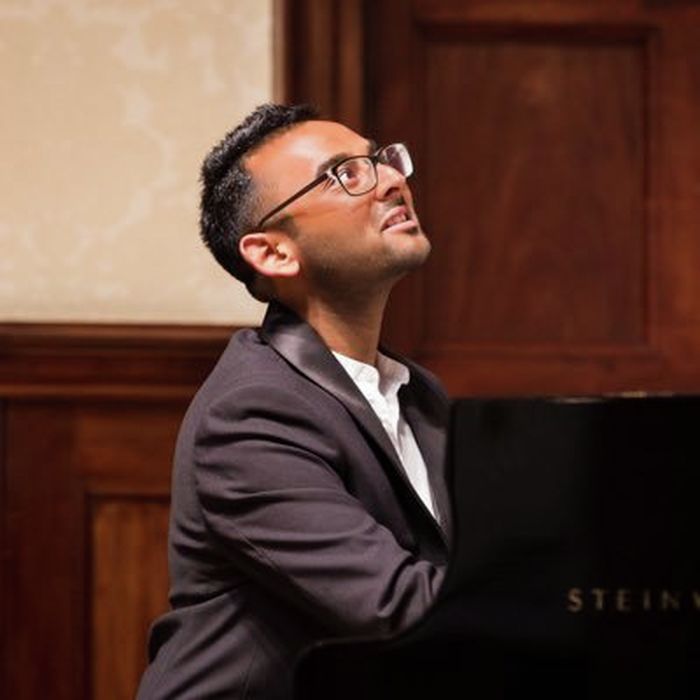The Sounds of My Upbringing
Isabella Todini tells the story of how her childhood music taste shaped her future self.

It’s 6pm, and my dad, who works all day, has returned home. He walks in through the back door, which leads straight into the kitchen. My younger sister and I, hearing his footsteps and the sound of the door frame, run down the hall, little feet against hardwood floors, almost slipping as we rush to join him. He turns on the stove and begins to prepare dinner, but the evening ritual has not quite begun until he picks up his iPod and turns it on. The cool, silver metal and glass backlit screen contain innumerable songs, but he thumbs the controls, circles and circles as he scrolls through, only stopping when he finds the familiar album cover, the three men before a green wall with a yellow title above. The album that holds the songs my sister and I beg for as we stand eagerly at his feet. The soundtrack to the Wes Anderson film The Darjeeling Limited becomes the soundtrack to the kitchen scene, six feet that wiggle and jump as we dance together.
My sister and I each had a favorite song, so my father’s choice was easy: he had only to pick from one of the two to keep us entertained, repeating our songs until we had learned them by heart. My sister’s song was “Les Champs-Élysées” by Joe Dassin, while mine was “Typewriter, Tip, Tip, Tip” by Kisore Kumar and Asha Bhosle. Both songs in foreign languages, I think the three of us indulged in escapist fantasies of worlds beyond the one we found ourselves in. This was especially true for my father, who travelled often for work, and so perhaps hoped to bring some of his desire for adventure and new horizons to our young lives.
“Les Champs-Élysées”, a song that weaves an upbeat and hopeful story of love between two strangers in Paris, was the perfect song for my sister, only three years old at the time, to bop and bounce to. While she may not have known what the lyrics meant, the easy refrain and the spirit of hope and dreams to be achieved let her sing and dance to her heart’s content, just as the protagonists of Dessin’s song do. The desire to express and to experience the love that Dessin sings of inspired my sister as she belted “aux Champs-Élysées!” throughout the house, entertaining us all, as she still continues to do.

For me, “Typewriter, Tip, Tip, Tip” was an exciting and engaging song with a beat and tone that kept me coming back to listen to it again and again. Kumar and Bhosle sing about the power of words as tools for the communication and understanding of love, a concept that must have made its way to me despite being in Hindi, as the song resonated with me and my passion for storytelling and written forms of experiencing life, while also giving me a buoyant rhythm to dance to alongside my father and sister. The most significant links between the two songs are the strong themes of love and romance. However, their connection is more than merely a theme; both songs speak of the simplicity of expressing and acting upon feelings for another person. In “Champs-Élysées”, this is explored in the lovers who sing and dance together, without ever thinking of embracing, an emotional connection that leaves them as anything but strangers the next day. Equally, in “Typewriter”, this concept is present in the idea of a love letter, a literal confession of love, and the way that delicate words can be used to reveal and cultivate intense love.
“Somehow, our future selves connected with the songs my father shared with us, lighting the path ahead”
Looking back, it almost seems as though the songs we loved represented who my sister and I would become, giving my dad a window into the future. We both embraced a love for travel and for adventure, something that guided us throughout our childhood as we were uprooted and moved from country to country, across the world. My sister grew a passion for elements of a traditionally French culture, such as cooking, and art, while I found writing to be a significant creative outlet, particularly growing up. Somehow, our future selves connected with the songs my father shared with us, lighting the path ahead.
Or, maybe, it’s because of the songs he played that we became the people we are. Perhaps the influences of the time we spent with him, twirling and laughing in the kitchen as he taught us about himself, his interests, and his own passions run deeper than we would have thought. We grew into the people we are now because of our experiences and numerous lessons throughout life, but it seems that his hand in our growth is particularly visible through the little fingerprints left by the songs played in the kitchen all those years ago.
 News / CUP announces funding scheme for under-represented academics19 December 2025
News / CUP announces funding scheme for under-represented academics19 December 2025 News / SU reluctantly registers controversial women’s soc18 December 2025
News / SU reluctantly registers controversial women’s soc18 December 2025 News / Cambridge welcomes UK rejoining the Erasmus scheme20 December 2025
News / Cambridge welcomes UK rejoining the Erasmus scheme20 December 2025 Features / Should I stay or should I go? Cambridge students and alumni reflect on how their memories stay with them15 December 2025
Features / Should I stay or should I go? Cambridge students and alumni reflect on how their memories stay with them15 December 2025 Film & TV / Timothée Chalamet and the era-fication of film marketing21 December 2025
Film & TV / Timothée Chalamet and the era-fication of film marketing21 December 2025










